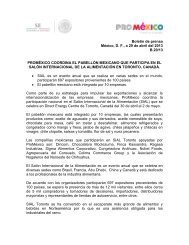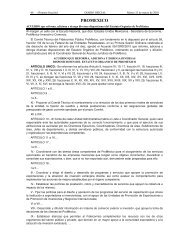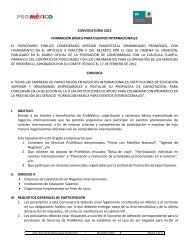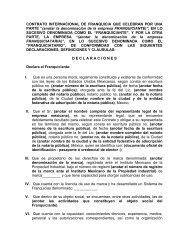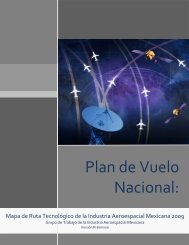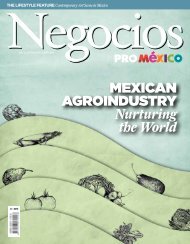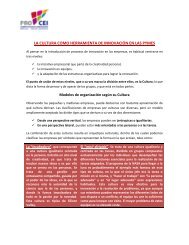MINING IN MEXICO S - ProMéxico
MINING IN MEXICO S - ProMéxico
MINING IN MEXICO S - ProMéxico
You also want an ePaper? Increase the reach of your titles
YUMPU automatically turns print PDFs into web optimized ePapers that Google loves.
FEEDBACK Xochipilli-Xochiquétzal<br />
It is easier said than done but it implies<br />
very hard work. Only three full time employees<br />
are in charge of coordinating, visiting,<br />
promoting and planning the logistics to ship<br />
the goods, which must travel from the rural<br />
communities to their final destinations.<br />
Also, in its 20 years of operating, Xochipilli-<br />
Xochiquétzal has supported itself with its<br />
own resources obtained through<br />
its intermediary work and helped<br />
by clients from abroad, who occasionally<br />
request and partially<br />
fund special workshops and seminars<br />
for specific craftsmanship.<br />
Future Plans<br />
Xochipilli-Xochiquétzal have managed<br />
to preserve the traditions of<br />
the artisans in the communities<br />
where they work and have also optimized<br />
their production and quality skills. They<br />
have also been able to implement additional<br />
small changes in these indigenous and rural<br />
communities of Mexico.<br />
Traditionally, in many of these places<br />
women have no access to work or any other<br />
type of opportunities. Even though women<br />
are typically the creators of most of the<br />
handicrafts, the local ways have always allowed<br />
them to produce them for use solely<br />
in their own dwellings.<br />
In Cuentepec, Morelos, for instance,<br />
women were the ones typically working the<br />
clay, making their own household products,<br />
only occasionally available for retail sale. In<br />
this community, only women were allowed<br />
to go to the clay mines but now the men help<br />
in some of the gathering work, as much as<br />
their tradition allows them.<br />
Today, some 26 women from Cuentepec<br />
are able to produce 1,000 pieces a week and<br />
Since 1991, these two organizations have<br />
helped craftsmen from various sites in<br />
Mexico ship their products to countries such<br />
as France, Italy, Germany, Austria, the US<br />
and Canada.<br />
when they are not sold to international clients<br />
through Xochipilli-Xochiquétzal, they<br />
can be sold in other markets.<br />
When Xochipilli-Xochiquétzal has given<br />
indigenous women the opportunity to work<br />
for a certain wage, the whole family contributes<br />
to the work, exponentially improving<br />
the quality of life of the community.<br />
“The money the women obtain through<br />
their work is usually well invested in improving<br />
the nurturing and education of their<br />
families or in house improvements. Giving<br />
them access to an additional source of income<br />
makes them feel better about them-<br />
selves,” says Inez Villaseñor.<br />
At the moment, the international handicrafts<br />
market is hardly going through a<br />
boom period, so Xochipilli-Xochiquétzal plan<br />
to concentrate their work in the 18 workshops<br />
they operate in five states.<br />
In the future, their plans are to begin a campaign<br />
amongst its beneficiaries, promoting increased<br />
contact between the craftsmen<br />
and the Fair Trade mission.<br />
“In the fair trade philosophy,<br />
the salaries must be competitive<br />
and you have to take responsibility<br />
for the men and women<br />
involved in the processes of production,<br />
as well as for the environment,<br />
complying with all the<br />
required standards. The working<br />
conditions must be optimized and<br />
the commercial relations must benefit the clients,<br />
traders and manufacturers equally and<br />
as much as possible,” claims Inez Villaseñor.<br />
These two organizations have not only<br />
managed to stay afloat but also in 20 years<br />
have implemented important structural and<br />
economic changes without undermining<br />
the traditional ways of making handicrafts<br />
in Mexico. They have also achieved international<br />
recognition and appreciation for these<br />
100% typical Mexican products. Undeniably,<br />
in a cult for the gods that inspired their<br />
names, they have become true modern patrons<br />
for Mexican artisans. n



